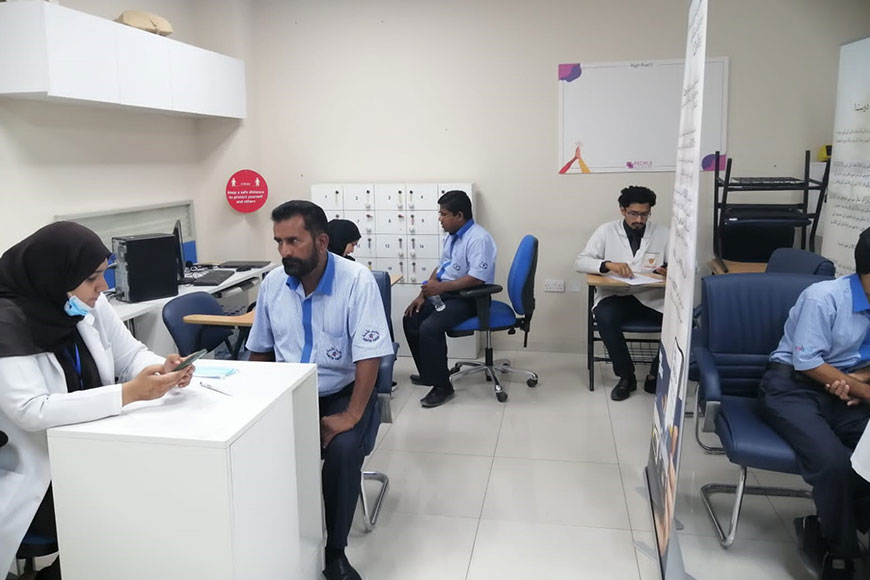A community engagement program to prevent and promote musculoskeletal health among taxi drivers working for CARS TAXI company, Ajman was organized on April 24th, 2023, by the students of Master in Public Health (MPH) and MBBS programs in collaboration with the Department of Physiotherapy, GMU.
The health promotion program was designed with an objective to educate taxi drivers on the importance of maintaining good posture and exercising regularly to prevent occupation-related musculoskeletal problems that can arise from sitting for long periods behind the wheel.

Work-related or occupational musculoskeletal disorders (OMSDs) can affect the neck, shoulders, elbows, wrists, backs, fingers, nerves, muscles, tendons, and synovial sheaths of the tendons. OMSD complaints are defined as pains, aches, or discomfort that persist for more than two or three days during the last week or year in a specific body region. A number of factors, such as high workload, have contributed to the increased risk of taxi drivers contracting musculoskeletal disorders (MSDs). As a result of their distinctive professional demands, taxi drivers are more likely to suffer from MSDs, hypertension, diabetes, and cardiovascular disease. To prevent or reduce the risk of MSDs, taxi drivers should take regular breaks to stretch and move their bodies, adjust their seats and steering wheel to ensure proper posture, and use ergonomic tools such as lumbar support cushions and wrist supports. It is also important for taxi drivers to maintain a healthy weight and engage in regular exercise to strengthen their muscles and maintain flexibility.
The program consisted of an interactive workshop that covered topics such as proper posture, stretching exercises, and tips for maintaining a healthy lifestyle. Physiotherapists practicing in the state-of-the-art and CARF accredited Thumbay Physical Therapy and Rehabilitation Hospital located in Ajman demonstrated various exercises and stretching methods for the benefit of the participating taxi drivers. Regularly performing these exercises can help to reduce pain, improve mobility, and prevent future injuries.

A pre-evaluation survey was conducted to assess the prevalence and pattern of OMSDs among the participants using a custom-made questionnaire based on the Standardized Nordic Questionnaire (SNQ). Respondents were asked if they had pain or aches in upper quadrant body regions (neck, shoulder, elbow, wrist/hand, and upper back) and four different lower quadrant body regions (lower back, hip/thigh, knee and ankle/feet).
The program was well-received by participants and was found to be effective in improving musculoskeletal health knowledge and behaviours among taxi drivers. At the end of the session, the participants were satisfied with the program and the objectives, and expressed satisfaction with the usefulness of the health promotion activity. The management of CARS TAXI, Ajman expressed their thanks to Gulf Medical University for promoting health of the taxi drivers, and fostering awareness about health and wellness.
“Community Engagement and Social Accountability is an integral part of GMU’s vision and mission, and I believe that the University should serve the immediate community in which it exists”, reflected Prof. Manda Venkatraman, Vice Chancellor Academics and Dean, College of Medicine, who is also the Chairman of the Community Engagement Committee of Gulf Medical University.

